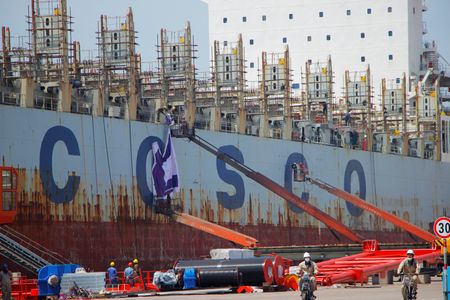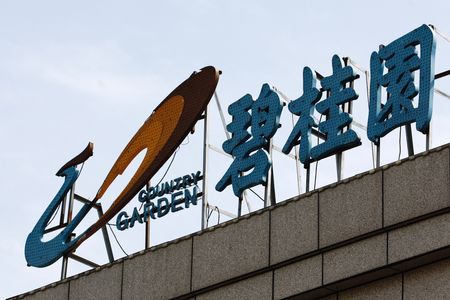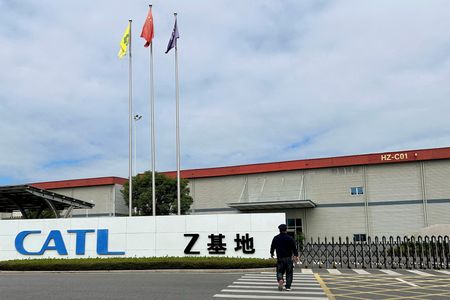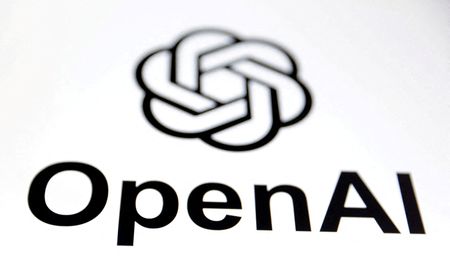By Florence Tan, Siyi Liu, Chen Aizhu and Nidhi Verma
SINGAPORE/NEW DELHI/MOSCOW (Reuters) -Chinese and Indian refiners are seeking alternative fuel supplies as they adapt to severe new U.S. sanctions on Russian producers and tankers that are designed to curb the revenues of the world’s second largest oil exporter.
The U.S. Treasury on Friday imposed sanctions on Russian oil producers Gazprom Neft and Surgutneftegaz, as well as on 183 vessels that form part of a shadow fleet that has so far allowed Russia to skirt sanctions to get its oil to global markets.
According to Morgan Stanley, which cited data from tanker tracker Vortexa, the tankers subject to the latest sanctions carried around 1.5 million barrels of crude oil per day in 2024. That equates to around 1.4% of global oil demand.
Many of them have been used to ship oil to India and China as Western sanctions and a price cap imposed by the Group of Seven countries in 2022 shifted trade in Russian oil from Europe to Asia. In addition, some tankers have shipped oil from Iran, which is also under sanctions.
Oil prices have jumped. Global benchmark Brent crude rose on Monday above $81 a barrel to its highest since August and the premium of prompt crude to that for delivery six months later has risen to its highest since April, implying traders expect supplies to remain tight. [O/R]
The Kremlin said the sanctions risked destabilising global markets, and Moscow would seek to counter them.
“It is clear that the United States will continue to try to undermine the positions of our companies in non-competitive ways, but we expect that we will be able to counteract this,” Kremlin spokesman Dmitry Peskov said on Monday.
China has also reiterated its opposition to unilateral U.S. sanctions.
ADAPTATION?
Analysts said the new sanctions were likely to reduce Russian oil exports in the short term, but Russia could adapt by using the vessels in its shadow fleet that are still not under sanctions.
Analysts also said the true size of Russia’s shadow fleet was unknown, but it was estimated to comprise close to 600 tankers.
Since the new sanctions, at least 65 oil tankers have dropped anchor at multiple locations, including off the coasts of China and Russia, ship tracking data showed.
Five of those were stationary off Chinese ports and a further seven dropped anchor off Singapore, with others halting near Russia in the Baltic Sea and the Far East.
Shandong Port Group banned tankers under U.S. sanctions from calling at its ports before Washington’s announcement on Friday.
The severity of the new measures has for now driven Chinese refiners back to sellers of oil that is not restricted, pushing up the spot markets for some regional crudes, as well as adding upward momentum on the global oil market.
Chinese refiner Yulong Petrochemical has previously bought Russian ESPO Blend crude, but over the weekend bought 4 million barrels of Abu Dhabi’s Upper Zakum crude loading in February and March from Totsa, the trading arm of French energy major TotalEnergies, traders said.
In recent weeks, it has also purchased Angolan and Brazilian crude, traders said, and is in talks to buy more oil from West Africa as well as Canada.
China’s Unipec on Friday also booked four very large crude carriers, which can carry up to two million barrels of crude, from the Middle East, figures from data intelligence firm Kpler showed.
The numerous sources Reuters spoke to declined to be named as they were not authorised to speak to media. Yulong and Totsa typically do not comment on commercial deals.
TWO-MONTH TRANSITION PERIOD
Currently, over 60% of Russia’s seaborne oil exports go to India, the world’s third largest oil importer and consumer.
Although Indian refiners have stopped dealing with oil tankers and entities under U.S. sanctions, the country does not expect disruption to Russian crude supplies during a two-month transition period, a government source said on Monday.
India will allow Russian oil cargoes booked before Jan. 10 to discharge at ports, the source said, adding that Russia could also offer deeper discounts to India to meet a $60 a barrel price cap imposed by Group of Seven countries in 2022. Shipments below that level can use western tankers and insurance.
Moscow-based Sinara Bank also said temporary discounts were possible for Russia’s flagship Urals oil blend to dated Brent.
Traders said Indian refiners, which bought spot Middle East crude last week before the sanctions were announced, were seeking more cargoes.
India’s Bharat Petroleum Corp Ltd bought 2 million barrels of February-loading Oman crude from Totsa via a tender last week, two people familiar with the matter said.
(Reporting by Florence Tan, Siyi Liu and Chen Aizhu in Singapore, Nidhi Verma in New Delhi and Vladimir Soldatkin in Moscow; Additional reporting by Trixie Yap in Singapore; Ethan Wang in Beijing; Anna Hirtenstein, Jonathan Saul, Robert Harvey and Enes Tunagur in London; Writing by Nina Chestney and Alex Lawler; Editing by Kate Mayberry and Barbara Lewis)











